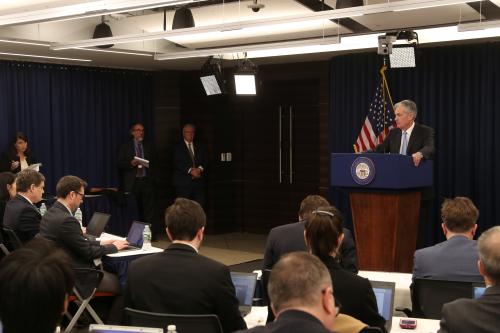Are the increasingly large and rapid movements of trillions of dollars across national borders enhancing the world’s prosperity? Or are these flows an enormous pool of footloose money that provokes financial turbulence, disrupts national economies, and severely damages welfare? The average citizen is unsure how to answer such questions. Policymakers and financial specialists espouse contradictory, and sometimes extreme, views. Some hail the benefits. Others warn ominously of the dangers.
The awkward truth is that cross-border- financial interdependence is both helpful and hazardous. Because ever more capital will flow across borders in future decades, it is certain that the benefits and the risks will both grow. What is also certain is that collective governance of cross-border finance, now in its infancy, will need to be substantially strengthened. Toward that end, policymakers and citizens alike should reject extremist views and support pragmatic efforts to enhance international cooperation about financial standards and the prudential oversight of financial systems.
Financial Activity and Financial Turbulence
The financial system of an individual nation can be likened to a reservoir that collects the savings generated in the economy. Savers place their funds in the reservoir. Investors draw funds out. Saving and investment decisions can be, and are, taken independently. The reservoir rises and falls as financial and economic conditions change.
Even in a well-functioning economy, particular investments turn out to be disappointments. Conditions change. Poor judgments are made. The inevitable mistakes and accidents cause waves, even storms, in the reservoir. Storms can spread and become virulent because of herding behavior, contagion, and excessive volatility in asset prices. Financial activity not only reflects, but thus can even itself cause, financial turbulence that in turn severely damages economic welfare.
The inherent fragility of national financial systems can be powerfully exacerbated by the risks and uncertainties stemming from cross-border finance. When particular investments go sour in an economy open to the rest of the world, repercussions get transmitted abroad. Mistakes and accidents can be especially problematic when investments have been financed with direct shifts of savings from one national reservoir to another. Cross-border and cross-currency liabilities amplify the consequences of distressed financial conditions. National financial reservoirs can be simultaneously afflicted by volatile cross-border capital flows, disruptive fluctuations in exchange rates, and severe balance-of-payments crises. Episodes of stormy weather can even lead to an occasional hurricane-level crisis.
The potential for financial instability cannot be attributed primarily to cross-border finance. The causes are deeply rooted in the information asymmetries, the expectational and informational cascades, and the adverse-selection and moral-hazard problems that pervade all aspects of financial behavior, domestic as well as cross-border. Yet the cross-border features magnify the potential.
Notwithstanding its hazards, financial activity is fundamentally beneficial. Financial intermediation and financial markets are underpinnings without which modern economies could not prosper. Because financial activity permits individuals and enterprises to make saving and investment decisions independently, the aggregate flows of both, and hence the growth of economic activity, can be substantially greater and more efficient.
Such generalizations apply with great force to open economies with extensive cross-border trade and financial activity. When the financial reservoirs of different nations are highly interconnected, the aggregate decisions of any single nation’s ultimate savers and ultimate investors need not be closely linked. Net transfers of saving from one nation to another permit saving and investment decisions to be independent for nations as a whole. Loosening the links between aggregate saving and aggregate investment for individual nations substantially enhances the potential for each nation’s economic well-being.
Judgments about financial activity should exaggerate neither the hazards nor the benefits. What is required is a balanced view of both.
Collective Governance for Financial Systems
Nations rightly try to prevent domestic financial instability—and to mitigate the consequences when it nonetheless arises—by maintaining a collective-governance- infrastructure for prudential oversight of the financial system. The critical features of this infrastructure include standards for accounting, auditing, and information disclosure; legal procedures for enforcing contracts and adjudicating disputes; prudential supervision and regulation of private financial institutions; an effective but limited potential for crisis management and crisis lending; and, not least, sound and predictable macroeconomic policies.
If a well-functioning collective-governance- infrastructure is a precondition for a domestic financial system to operate smoothly, why is one not needed on a world scale? One’s intuition wants to respond that the same logic does apply at the world level. And the economic aspects of the logic are, indeed, persuasive. If there could exist supranational analogues to the functions carried out within domestic financial systems by nations’ central banks and supervisors of financial institutions, the global economy could evolve in a more stable manner.
If cabbages were horses, all could ride like kings. But cabbages are not horses. The requisite political preconditions do not exist for the logic to be fully applied on a world scale. Except for some rudiments and nascent efforts, collective-governance institutions that can effectively carry out the functions of a supranational financial infrastructure are not yet part of the evolving global financial system.
To be sure, efforts have intensified in the past several years. Genuine progress has been made. But much more remains to be done. Continuing to develop the nascent supranational infrastructures should be a top priority for intergovernmental cooperation in the next few decades.
The most difficult obstacles to international agreement about standards for financial systems are fundamental inconsistencies in national laws. The only way to resolve the dilemma in those cases is to alter national arrangements to conform to a single, internationally agreed arrangement. When national standards differ but are not in direct conflict, the preferred approach to designing world standards is to encourage agreed minimum standards and allow differences among nations above that minimum to persist.
Monitoring and enforcing world standards and oversight norms will soon become at least as important as sound design. As a practical matter, most monitoring and enforcement must be carried out within each nation by its own collective-governance infrastructure. Each national government must take political responsibility for explaining the importance of world standards to its citizens and must strengthen its own procedures for self-assessment. The world community can encourage implementation, but it cannot impose or enforce it.
Self-assessment alone, however, will be insufficient. To ensure rigor, to foster consistent application of world standards across national jurisdictions, and to enhance credibility, national self-assessments should be complemented by external verification and probably even by external assessments. Thus the world community should nurture a beginning, tentative process of overview assessments by international financial organizations. Those overviews should concentrate initially on a straightforward description of a nation’s existing standards and practices and the degree to which they are consistent with the standards evolving at the world level. A strategy along these lines is in fact emerging, to be implemented jointly through a variety of international organizations and consultative groups.
Different Nations at Different Stages of Development
Many developing nations lag behind industrial nations in the evolution of their financial systems and collective-governance infrastructures. Hence financial standards and prudential oversight often fall below evolving minimum world standards. The risks of general financial instability in those nations are accordingly also greater. Developing nations are more vulnerable because their economies are smaller and often more open. Herding behavior and contagion tend to be more virulent, causing greater difficulties.
Much of the saving imported from abroad into the financial systems of developing nations is skittish capital or can quickly become so. Portfolio investors and creditors from the financial reservoirs in the industrial nations can be unforgiving about problems in developing nations and may withdraw on slight provocation, especially if they observe other investors heading for the exit.
The propensity of foreign investors to be skittish does not change the fact that an individual nation can gain greatly from cross-border finance by smoothing the path of its consumption over time. A prudent nation will try to hedge against the future through a net accumulation of income-earning assets abroad during good times. During difficult times it can then hope to be a net borrower from abroad, thereby preventing consumption levels from falling proportionately with temporarily diminished incomes. Unforgiving foreign investors in a developing nation, however, may complicate putting that policy into practice.
Nations at different stages of development also have differing capabilities for remedying the shortfalls in the prudential oversight of their financial systems. Administrative skills may be especially scarce in developing nations. Budgets may be particularly constrained. The world community would therefore be unwise to request an immediate across-the-board raising of national to world minimum standards. Today’s advanced industrial nations took decades to improve their own standards, norms, and procedures. The diversity in capacities among nations is a primary reason for supporting international minimum standards rather than uniform harmonized standards for all nations.
A few jurisdictions in the world financial system attract financial activity by deliberately fostering regulatory arbitrage and supervisory laxity. At worst, some “renegade” jurisdictions abet financial crime and money laundering, assess little or no tax on capital themselves, and encourage tax evasion by citizens of other nations. The governments of responsible nations should take collective action to constrain this behavior. A mild but partially effective first step, taken in 2000, is to cooperate in “naming and shaming” offending jurisdictions.
Financial systems and their prudential oversight differ not just between developing and developed nations but also within the developed nations themselves. Pronounced differences, for example, between continental European and Anglo-Saxon norms for corporate governance lead to differences among banking systems. Japan, Europe, and North America also differ in their detailed norms, procedures, and institutions for prudential oversight.
Many commentators in the largest industrial nations, forgetting their own nations’ past financial panics and inadequate prudential oversight, tend to look down their noses at the financial systems of emerging-market and developing nations. But as Japan’s troubled financial system reminds us, the industrial nations too have deficiencies in financial standards and prudential oversight that need to be remedied. If the international community is to encourage an appropriate evolution of collective governance for the world financial system, the industrial nations should not downplay their own problems while self-righteously recommending that the developing nations pull up their financial socks.
Traffic Regulations for Cross-Border Capital Flows
A sensible starting point when considering policy guidelines for cross-border capital flows is to think of an individual nation as a relatively unprotected island in a large ocean. Its economy and financial system are the harbors through which all shipping into and out of the island passes. The most its government can hope to do is to provide partial protection for its harbors by maintaining financial breakwaters.
A prudent and carefully circumscribed use of breakwater measures can be a sensible part of an overall national economic strategy. Most nations, not least those whose financial systems are at early or middle stages of evolution, would like simultaneously to pursue three goals: exchange-rate stability, autonomy for national monetary policy, and financial integration with the rest of the world. As economic textbooks declare, these three goals are an “impossible trinity.” The more a nation strives to attain any two of the three, the more it must surrender aspirations to simultaneously achieve the third. What the textbook catechism fails to point out, however, is that no nation need be purist in choosing- among the three goals. Rather than striving for the whole loaf of financial autonomy and a whole loaf of freedom for cross-border financial transactions, for example, a nation could surrender some of both objectives, aiming at half a loaf of autonomy and half a loaf of financial integration. More -generally, most nations will be better off aiming at a compromise combination of all three, though no one compromise is likely to be ideal for all nations in all circumstances.
The eclectic attitude about financial breakwaters is likewise appropriate for the choice of a nation’s exchange-rate regime. Notwithstanding a vast literature in international finance seeking to identify “optimum” exchange-rate arrangements, the yearning for an ideal regime—any one single set of arrangements—is badly misguided. It is especially easy for a nation to get into financial trouble by pegging its exchange rate to another currency. But any conceivable exchange regime can be overwhelmed in stormy financial conditions. The manner and degree of exchange-rate variability are not, in themselves, the financial policy issues of overriding importance for a nation. A wise government will place greater priority on developing sound macroeconomic policies and ensuring high standards and competent prudential oversight for the nation’s financial system.
A nation can easily make mistakes when maintaining financial breakwaters. Injudicious use can not only deny sizable benefits to itself but also harm other nations. The effectiveness of breakwaters tends to be eroded over time. Nevertheless, some types of breakwaters are viable and can provide modest protection. Two examples are a cross-border capital withholding tax and reserve requirements on the short-term liabilities to foreign depositors and investors of the domestic offices of financial institutions. In addition, prudential restraints such as upper limits on the net open foreign-exchange positions of financial institutions should be a permanent part of a nation’s financial supervision and regulation.
Guidelines for cross-border financial transactions sanctioned by the world community should likewise embody a nuanced and balanced approach. As a general principle, they should respect the diversity of nations’ circumstances and allow national discretion and experimentation. Traffic regulations endorsing full liberalization of capital flows are neither desirable nor politically feasible. For the foreseeable future, guidelines must be “soft law.”
Again as a general principle, the international community and the International Monetary Fund should give substantially higher priority to individual nations’ overall financial standards and prudential-oversight policies than to the specifics of any financial breakwaters. International guidelines should discourage the use of breakwaters as a substitute for sound macroeconomic policies, for maintenance of a strong international investment position, or for competent supervision and regulation of the financial system generally. Financial breakwaters should rely where possible on market forces rather than on direct administrative controls and should be designed as much as possible to limit opportunities for regulatory capture or corruption. Nations will also typically be better advised to design breakwaters as transitional measures and to use them to try to moderate unwanted capital inflows rather than to try to stem unwanted capital outflows.
A Middle-Way Vision
The beginning of wisdom in weighing the complex questions of cross-border finance is to appreciate the fact that the scales do not tilt unambiguously to the benefits side or the risks side. Polarized positions emphasizing only the benefits or only the risks are good for sound bites, but they do not stand up to careful scrutiny.
One polar position—the untrammeled-markets view—is that cross-border finance is so efficient and beneficial that it is a mistake to interpose any measures of collective governance. Advocates of this view, cousins to Dr. Pangloss, argue that unfettered capital markets will be all for the best in this nearly best of all possible worlds.
The opposite polar position—the sweeping institutionalist reform view—is that market failures are pervasive internationally as well as domestically. Advocates often recommend greatly enhancing the authority of international institutions. Some also slide into recommendations that individual nations should erect very high breakwaters, if not a Great Wall, around their financial systems.
As public debate about cross-border capital flows and financial interdependence intensifies, policymakers and the informed public should be deeply suspicious of the two polar views. Neither is based on compelling analysis. Both are politically unrealistic. Market failures and financial turbulence put great pressure on governments to “do something.” The untrammeled-markets advice to “Don’t do something! Just stand there!” almost invariably—and usually appropriately—buckles under crisis-generated political pressure. The sweeping institutionalist reform view badly underestimates the relevant political constraints. The next decade or two are unlikely to see a radical increase in the authority of existing international institutions or the creation of new ones. The cosmopolitan dream of creating global federalist institutions to exercise collective governance at the world level—the formal beginnings of a world government—stands no chance of fulfillment for many decades.
Defenders of a middle way can draw comfort from knowing that they are on familiar ground, participating in a -centuries-old debate. Thoughtful analysts have always recognized a tension between market efficiency and market failure. The decentralized decisionmaking embodied in market supplies and demands can accomplish allocative feats of marvelous complexity. But markets can also malfunction. Decentralized noncooperative decisionmaking in some circumstances produces outcomes decidedly inferior to those attainable through collective action. Institutions of collective governance can supply, or induce private economic agents to supply, collective goods that would not be provided at all, or would be provided inadequately, in the absence of the collective decisionmaking. Yet institutions of collective governance can malfunction too. Soundly managed nations, and sensible evolutions of the world polity and economy, thus require safeguards against both market failures and government failures.
Today’s complex world of intermediate interdependence requires enlightened middle-way policies. It is quixotic to make recommendations that assume much more political integration and supranational decisionmaking than is now feasible. It is an even bigger disservice to argue that markets will sort things out efficiently if governments will just stand aside and let the markets “get the prices right.”
The eclectic’s position is unsatisfyingly bland. But there continues to be deep wisdom in the aphorism that the middle of the road is preferable to the ditch on either side. Phoebus’s advice to the impetuous Phaeton—medio tutissimus ibis (you will go most safely by the middle way)—is not an infallible guide to sound policy. But it will very often save those holding the reins from dangerous errors.



Commentary
Cross-Border Financial Interdependence: Helpful and Hazardous
September 1, 2001